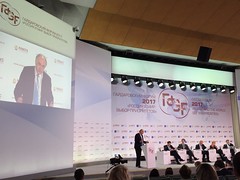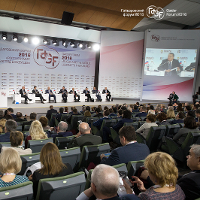12 January 2017 - 14 January 2017
Moscow, Russia
Russia and IIASA: Setting priorities
Russia is a founding member of IIASA with forty-five years of continuous intensive cooperation resulting in a range academic and science to policy achievements (see box below for examples of recent collaborations).
Gaidar Forum 2017
The Gaidar Forum has been the central political and economic annual international scientific conference in Russia since 2010. Organized by the Russian Presidential Academy of National Economy and Public Administration (RANEPA), the Gaidar Institute for Economic Policy, and the Association of Innovative Regions of Russia (AIRR). The emphasis of this year's Forum lied on the most acute current global challenges with a focus on Russia’s place and strategic role in the world. The Gaidar Forum provided a meeting point for theorists and practitioners, leading scientists and politicians, and representatives from the financial sector. Professor Yegor Gaidar, former Russian Prime Minister, considered by many to be the intellectual leader of Russia's economic reform in the early 1990s, made extended visits to IIASA when the institute was analyzing the issues of economic reform in the Soviet Union.
IIASA Director General and CEO Professor Dr. Pavel Kabat; World Population Program (POP) Director Wolfgang Lutz; POP Deputy Director Sergei Scherbov; Advanced Systems Analysis (ASA) Program Director Elena Rovenskaya; Evgeny Vinokurov, Associate Senior Research Scholar; ASA Research Scholar Anastasia Stepanova; and Science Diplomacy Officer Sergey Sizov were invited participants at this event. Their sessions included:
- Kabat participated in a Panel Discussion entitled "Patterns of Sustainable Development as Defined Today" on 12 January from 9.30-11.30am. The discussion focused on such topical issues as long-term goals of sustainable development, the Paris climate change agreement, technological challenges for innovation, and the role of business in achieving sustainable development. He was joined by Tarja Halonen (President of Finland (2000-2012) and Co-chair, UN Secretary-General's High-level Panel on Global Sustainability), Jeffrey Sachs (IIASA Distinguished Visiting Fellow, Special Advisor to the United Nations Secretary-General on the Sustainable Development Goals, and Director of the Earth Institute at the Columbia University), Paul Polman (CEO, the Unilever Group), Guido Schmidt-Traub (Executive Director, the UN Sustainable Development Solutions Network), and Clyde C. Tuggle (Senior Vice-President, Coca-Cola Company).
- Launch of the Russian Demographic Datasheet 2016 (see box below) on 13 January, 3.00-5.00pm. It included a panel discussion with Pavel Kabat, Wolfgang Lutz, Sergei Scherbov, and Svetlana Nikitina (Head, Department of Population Statistics, Rosstat), among others.
Russian Demographic Datasheet 2016
The Russian Demographic Datasheet 2016, a collaboration between POP at IIASA, RANEPA and the Russian Federal State Statistics Service (Rosstat) will be launched at the Gaidar Forum 2017. For the first time, key demographic indicators and main population trends for all subjects of the Russian Federation, including population projection for 2035 are comprehensively presented in one data sheet. Special attention is given to the importance of alternative indicators of population aging for the current and future population changes across Russia.
For many years IIASA researchers Scherbov and Warren Sanderson have developed new measures of age and aging in demographic research. They suggest to broaden research methods to account for significant increases in life expectancy, as the focus on chronological age of people alone provides a limited picture of the process, one that is often not appropriate for either scientific study or policy analysis. Their groundbreaking results have been published in Nature and Science and other high level journals. Scherbov is also PI of the Reassessing Aging from a Population Perspective (Re-Aging) project at IIASA that, among other things, ascertains the extent to which advanced societies are actually aging in multiple dimensions, including health, cognitive abilities, and longevity.
Further Gaidar Forum sessions including IIASA program directors and researchers:
- Panel Discussion: "Europe from Lisbon to Vladivostok: Dream or Reality?", 13 January, 9.30-11.30am. Evgeny Vinokurov, Associate Senior Research Scholar at IIASA, was part of the Panel. This session focused on the matters of regional and global integration, TTP and TTIP projects, current contradictions between the national interest and globalization process and on trade-economic relations of states in the space from Lisbon to Vladivostok which are historically stable and mutually beneficial.
- Expert Discussion: "Trade and Economic Development Strategy for Russia and EAEU in the Current Context", 14 January, 12.30am-2.30pm. Vinokurov participated in this session. This session analyzed major breakthroughs in the global trading system triggered by regionalization, deepening Eurasian integration, wider global interests of domestic businesses, shapes of new approaches to the Russian integration strategy.
- Expert Discussion: "Banking Sector Sustainability", 14 January, 10-12am. Elena Rovenskaya, Advanced Systems Analysis Program Director at IIASA, joined this discussion as an expert, focusing on systemic risks and possible approaches to reform regulation and supervision in the banking sector.
Photo Gallery

IIASA and Russia
During Russia's forty-five year membership of IIASA, the Institute has helped it to:
- Find solutions to the complex global challenges that impact a country’s economy, environment, and society.
- Develop their research base for systems analysis.
- Establish new multilateral scientific relationships that contribute to a country’s soft power.
With this in mind, during his visit to Moscow Kabat aims to further enhance collaborative activities between Russia and IIASA through holding a wide range of high-level meetings with a number of leading experts in the government, academia and business, including:
- Prime Minister of the Russian Federation Dmitry Medvedev
- Academician Vladimir Fortov (President of the Russian Academy of Sciences)
- Deputy Minister of Science and Education of the Russian Federation Veniamin Kaganov
- H.E. Esko Aho (Executive Chairman of the Board, East Office of Finnish Industries and Prime Minister of Finland (1991-1995))
- H.E. Dmitry Pankin (Chairman of the Management Board, Eurasian Development Bank)
- Academician Anatoly Torkunov (Rector of the Moscow State Institute of International Relations)
Collaborations between IIASA and the Russian Federation
Since 2008 IIASA has intensified its collaborations with the Russian Federation (Russia), leading to new joint research projects, increased interactions with Russian policymakers, significant scientific exchange through people, and a highly productive publication record.
Current projects include exploring the challenges and opportunities of Eurasian economic integration, how to minimize wildfires, population aging in Russia, and advancing the methods of systems analysis. Interactions now take place regularly between IIASA and representatives from Russian Ministries and the Administration of the President of the Russian Federation.
Knowledge transfer between IIASA and Russia is also facilitated through multiple exchanges with Russian scientists who spend periods working in IIASA’s international and interdisciplinary research environment. The scientific output from these numerous formal and informal activities is highly productive, with almost 800 joint publications since 2008.
CONTACT DETAILS
Distinguished Emeritus Research Scholar Social Cohesion, Health, and Wellbeing Research Group - Population and Just Societies Program
Distinguished Emeritus Research Scholar Population and Just Societies Program
Program Director and Principal Research Scholar Advancing Systems Analysis Program
Demographic Data Sheets
Info sheet on IIASA Activities with Russia
PUBLICATIONS


